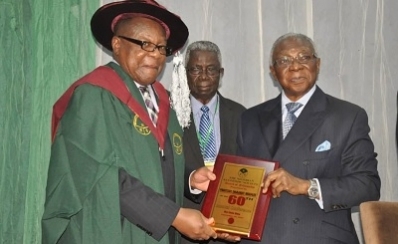
Abuja, 18 Sept. 2019, ACBF -- The Executive Secretary of the African Capacity Building Foundation (ACBF), the African Union’s agency for capacity development, was inducted into the body of fellows of the Nigerian Economic Society (NES) on 16 September 2019. NES fellows are men and women who have distinguished themselves in the field of economics or related fields.
Prof. Emmanuel Nnadozie was robbed in the fellows’ silk gown and presented with his plaque at a ceremony witnessed by senior officials of governments and multilateral organizations as well as academics. The induction was one of the highlights of the 60th annual conference of the Society held at the impressive NAF Conference Centre and Suites in Abuja, Nigeria’s capital city.
According to the President of the NES Prof. Tamunopriye Agiobenebo, the conferment on Prof. Nnadozie was in recognition of his contribution to capacity development in Africa as well as for the admirable manner he has been leading the ACBF. In a citation, the Executive Secretary was also praised for his contribution to the disciplines of development economics and for his contribution to numerous reputable academic journals.
Prof. Nnadozie expressed gratitude to the Society for the honor and pledged to “continue to push for sustainable economic policies that will ensure a better quality of life for all Africans.”
By this award, Prof. Nnadozie joins an elite club of fellows honored in the past -- such as the late Prof. Adebyo Adedeji, the first Executive Secretary of the Economic Commission for Africa (ECA) -- the first fellow inducted by the Society in 1988. Today, there are 57 fellows, including former Managing Director of the World Bank Dr. Ngozi Okonjo-Iweala, and current President of the African Development Bank (AfDB) Dr. Adesina Akinwunmi.
Before becoming ACBF’s Executive Secretary in 2013, Prof. Nnadozie was the Chief Economist and Director of Macroeconomic Policy Division of the United Nations Economic Commission for Africa (UNECA) in Addis Ababa, where he worked from 2004.
The Nigerian Economic Society was formed in 1957 to provide a platform for Nigerian economists and related social scientists to provide intellectual leadership in the process of understanding and managing economic, social and political changes in Nigeria. It also promotes the study of economics and makes the country’s economists and social scientists relevant to its economic, social and political development.
This year’s conference whose focus was on economic policies and quality of life in Africa examined the impact of economic policies on six sub-themes namely poverty profile, educational outcomes, quality of healthcare and nutrition, road infrastructure, access to water and sanitation facilities, as well as unemployment and economic inequality.





